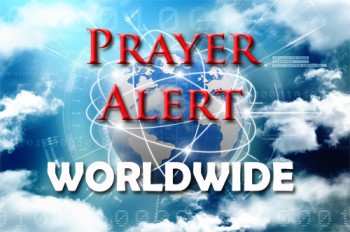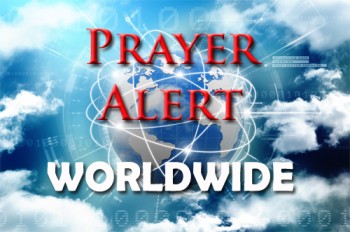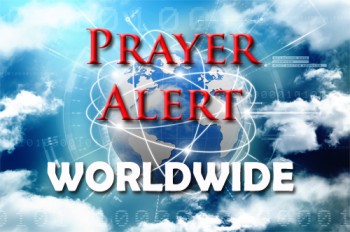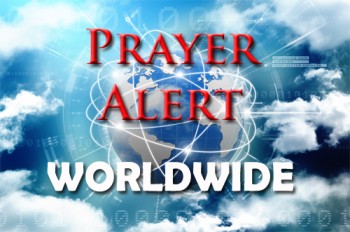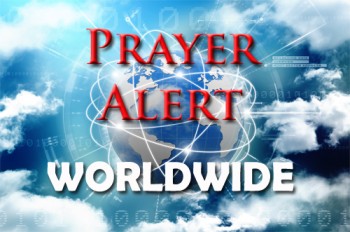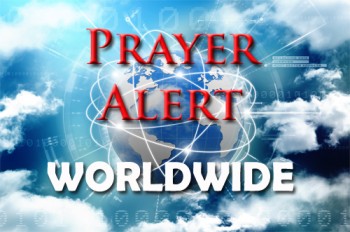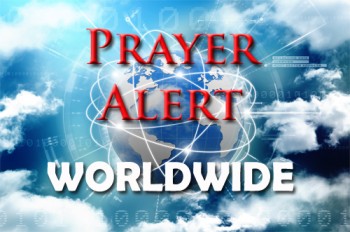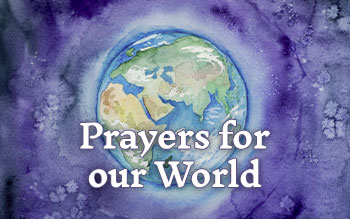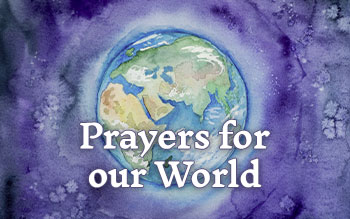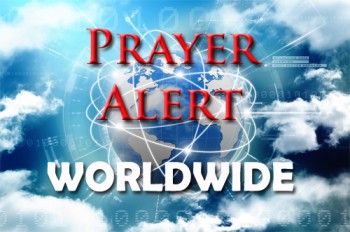Displaying items by tag: Africa
Burkina Faso: another church attack
For the second time since Easter, a church in Burkina Faso has suffered a terrorist attack during a Sunday services. This target was a Catholic church in Dablo, where the priest and five worshippers were killed. This prompted a series of déjà-vu headlines among global media outlets as the death toll matches last month’s attack on an Assemblies of God church. The assailants again arrived on motorcycles and interrupted morning Mass, shooting the congregation as they tried to flee. They ordered the women and children to clear the scene before executing six men, including the priest, and setting fire to the church The martyred priest, 34-year-old Simeon Yampa, was described as ‘a humble person, obedient and full of love’. The nation has suffered hundreds of attacks by jihadists in recent years, but these two were the first on houses of Christian worship.
Nigeria: 894 children released
Since 2012, non-state armed groups in north-east Nigeria have recruited and used children as combatants and non-combatants, raped and forced girls to marry, and committed other grave violations against children. Some of the girls become pregnant in captivity and give birth without any medical care or attention. Recently 894 of these children, including 106 girls, were released from the ranks of the Civilian Joint Task Force (CJTF) in Maiduguri, north-east Nigeria, as part of its commitment to end and prevent the recruitment and use of children. The CJTF is a local militia helping Nigerian security forces fight against insurgency by protecting communities from attack. The children will now be helped to return to normal civilian life and learn vocational skills. Pray for the children who have borne the brunt of this conflict, witnessing killing and violence, resulting in serious implications for their physical and emotional well-being.
South Africa: Christians march for true freedom
Worship songs and heartfelt prayers filled the streets of neighbourhoods across South Africa on Freedom Day, Saturday 4 May, as believers celebrated their freedom in Christ and prayed for change in the country. Over 80 Jesus Marches took place in small towns and in big cities. Many participants were armed with black bags to clean the streets while praying. At the 10am start of the marches a prayer for the nation that was streamed to all the march venues via mobile phones. The central theme was John 8:36 - ‘Who the Son sets free is free indeed’. Many referred to the event as celebrating ‘True Freedom Day’, as only Christ can truly set us free and no government or worldly system can provide all the answers to society’s problems. Christians were encouraged to wear white on election day - Wednesday 8 May. See also the next article, on the elections.
South Africa: pivotal elections
Twenty-five years ago, under Nelson Mandela, the African National Congress (ANC) party ended apartheid, but since then it has governed poorly. Four in ten South Africans still live in poverty. Half of young people are unemployed, in an unequal society caused by corruption at all government levels. Seven out of ten South Africans don't trust politicians and many under-30s did not bother to vote in the 8 May elections. At the time of writing, ballot results are trickling in with the results expected on 11 May. The weakness of its challengers means that the ANC is expected to win again, but national projections show a drop in support of 8%. Recently the ANC replaced President Zuma with his deputy, Cyril Ramaphosa, who is attempting to recover stolen state funds. So far he has been unable to remove the deeply entrenched crony networks of corrupt local officials and power brokers who deliver many votes for ANC. See also the previous article, and
Sudan: ‘deep state’ of Islamists remains
Omar al-Bashir is no longer Sudan’s president, but those who served him want to hold on to power through a military council. Meanwhile, protesters are still staging a sit-in outside Khartoum’s military headquarters and demanding that power be handed over to civilians. Islamist regime insiders who were close to al-Bashir remain in the shadows, and, unfortunately for the Christian minority of 3%, they are determined to maintain their grip on power. These Islamists are what is being described in media reports as a ‘deep state’ of shadowy authority figures that could eventually seize power in a counter-coup. Islamist influence is strong in the upper echelons of the armed forces and political parties are weakened by decades of authoritarian rule. It will be difficult for independent individuals with experience and strength to deal with these dangers.
Mozambique left in ruins by second cyclone
For the first time in recorded history, Mozambique has been hit by two cyclones in one season. Category 4 Kenneth arrived six weeks after Idai killed 600+ people with flooding. Kenneth killed at least 41 people and destroyed thousands of homes across northern Mozambique. Ibo Island was particularly hard hit, receiving food aid only six days after Kenneth destroyed thousands of homes. The human cost of the disaster is only now being revealed. The UN described reaching Ibo as ‘incredibly difficult’. Initial estimates are that 90% of structures were damaged. ‘If somebody hasn’t lost everything, he’s a lucky guy because no-one has escaped,’ said a motorcycle taxi driver. Almost everybody lost their belongings. The World Food Programme said that Kenneth dumped twice as much rain as Idai, nine inches, or about a quarter of the average annual rainfall for the region - again raising concerns about climate change. See
Burkina Faso: motorcycle gunmen kill Christians in church
Motorcycle gunmen, suspected to be Islamist militants, sprayed bullets at Christians attending a church service in Burkina Faso, killing a pastor and at least four others, according to local reports. A further two Christians are said to be missing following the early afternoon bloodshed on Sunday 28 April in the small northern town of Silgadji. The attackers fled north towards the country’s border with Mali. A rising tide of Islamic extremism in Mali has produced growing terrorism that is now spilling over into impoverished Burkina Faso, which is over 50% Muslim and about 20% Christian. Two days earlier Islamists were blamed for murdering five teachers and another worker at a school in the east of the country.
Nigeria: Christians slaughtered at baby dedication
Over a dozen Christians, including children, were slaughtered by Fulani militants following an infant dedication service in the Nigerian state of Nasarawa.
Morning Star News reports that the attack took place on Palm Sunday as Christians in the predominantly Christian community gathered to eat after the child was dedicated that morning at Ruhaniya Baptist Church in the village.
Fulani militants, who have increasingly targeted Christians, stormed the party and opened fire indiscriminately, killing 17. The militants claimed the life of the baby’s mother, Safaratu John Kabiru Ali, along with several others, some of whom were children as young as 10. The baby’s father, John Kabiru Ali, is currently in critical condition after suffering gunshot wounds.
A local resident told Morning Star News that among those killed were “10 members of the Ruhaniya Baptist Church, five members of Evangelical Reformed Church of Christ, one member of the Evangelical Church Winning All, and a musician playing for guests.”
Samuel Meshi, chairman of the Akwanga Local Government Council, told the outlet the group of Christians did nothing to provoke the horrific attack.
“They just started shooting sporadically on a community that was just having a feast of the dedication of a child after a church service earlier in the day on Sunday (April 14) at a Baptist church in the area,” Meshi said.
“The killings occurred in the evening of that day. Unfortunately, these persons were killed in cold blood for just no reason,” he noted.
Pastor Samson Gamu Yare, community leader of the Mada ethnic group in Nasarawa state, described the killings as “barbaric” and called on the federal government to urgently take measures toward curtailing the menace of extremist herdsmen attacks on his people.
Nigerian outlet The Punch notes that the governor of Narasawa State, Umaru Tanko Al-Makura, has demanded that the perpetrators be apprehended immediately.
“This is something we are going to take seriously. We are going to have a Security Council meeting and I have already directed security operatives to ensure that they fish out these people and bring them to book,” Al-Makura said, according to Channels TV.
Major General Adeyemi Yekini subsequently announced his strategy to track and arrest those involved in the attack.
“I have directed my troops to move to Akwanga and join other security forces to track down the perpetrators of this crisis; let us apprehend them so that justice can be done,” he said.
Nigeria ranks as the 12th worst country in the world when it comes to Christian persecution, according to Open Doors USA’s 2019 World Watch List.
The Fulani herdsmen are an ethnic group of over 20 million in West and Central Africa. Herders have been known to travel hundreds of miles while carrying weapons to protect their livestock. While they have clashed with indigenous tribes and Christians for centuries, only a small subset are extremists and engage in attacks, according to the Global Terror Index.
However, Open Doors notes that the clashes have intensified in recent years and led to the destruction of houses and churches, as well as the seizure of land and properties belonging to Christian owners. Open Doors concluded that the Nigerian government has historically failed to protect Christians, particularly women and children, from Fulani extremist violence.
Last Easter, Fulani herdsmen carried out an attack on morning Mass at Saint Ignatius Catholic Church in Mbalom, central Nigeria, leaving two priests and at least 17 parishioners dead. About 30 attackers also ransacked a burial ceremony and burned dozens of homes in the community, according to reports.
On March 4, Fulani militants in the Benue state reportedly attacked three villages, killing 23 people with bullets and machetes, according to International Christian Concern.
Also in March, 52 people were killed, dozens injured and around 143 homes were destroyed in attacks on the villages of Inkirimi, Dogonnoma and Ungwan Gora in the Maro district of the Kajuru Local Government Area.
PRAY
Pray for the bereaved that they will know the comfort and presence of God in their grief.
Pray that the extremists will be brought to justice.
Pray for the Government of Nigeria to have greater success with resolving this longstanding issue.
SUDAN: coup Military leader vows to ‘uproot regime’
The leader of Sudan's interim military council has vowed to "uproot the regime" two days after a military coup.
Speaking on TV, Lt-Gen Abdel Fattah Abdelrahman Burhan announced the restructuring of state institutions, the end of a night curfew and the release of political prisoners.
Protests continue despite the ousting of long-time leader Omar al-Bashir.
Demonstrators have demanded an immediate move to civilian rule and vow to stay in the streets.
Gen Burhan, who replaced the coup leader after he resigned on Friday, also dissolved all provincial governments and pledged respect for human rights.
The army would maintain "peace, order and security" across Sudan during an already announced transition period that would last at most two years until elections could be and civilian rule introduced, he added.
Using a more conciliatory tone, Gen Burhan also called on the opposition to "help us restore normal life", promised to try those who killed demonstrators and vowed a war on corruption.
The speech followed the resignation of feared security chief Gen Salah Gosh hours after the coup leader himself, Defence Minister Awad Ibn Auf, stepped aside. No official reason has been given for either departure.
Later on Saturday the army named Lt Gen Mohamed Hamdan Dagalo as the deputy head of the Transitional Military Council.
Known by the nickname "Hemeti", the general commands the paramilitary Rapid Support Force (RSF), which grew out of the government-backed Janjaweed militia.
The Janjaweed are accused of carrying out atrocities in the western region of Darfur in the early 2000s.
What has the opposition said?
Opposition groups have met the military to discuss "transitional arrangements".
Protester spokesman Mohammad Youssef al-Mustafa told the BBC they insisted on the immediate creation of a civilian government, but said military figures would be allowed a role in it.
And according to the privately-owned Baj News website the leader of the opposition Sudanese Congress Party, Omar el-Digeir, said representatives had demanded a civilian government with "full executive powers" and a role for civilians during the transition.
He also said they were waiting for the army to release jailed demonstrators, as promised.
The Sudan Professionals Association (SPA), which has been spearheading the demonstrations, said the council's response "did not achieve any of the demands of the people" and urged protests to continue.
Among its demands are the restructuring of state security, the arrest of "corrupt leaders" and the dissolution of militias that operated under former President Bashir.
How did we get here?
When Mr Bashir was removed, he was replaced by a military council led by Mr Ibn Auf.
But demonstrators camping out outside army headquarters in the capital Khartoum refused to disperse, rejecting Mr Ibn Auf as an ally of Mr Bashir.
Mr Ibn Auf was head of military intelligence during the Darfur conflict and the US imposed sanctions on him in 2007.
On Friday the new leader announced he was resigning and being replaced by Gen Burhan, who is seen as a less controversial figure.
Protestors have called for the abolition of "arbitrary decisions by leaders that do not represent the people" and the detention of "all symbols of the former regime who were involved in crimes against the people".
"Until these demands are fully met, we must continue with our sit-in at the General Command of the Armed Forces," the SPA said.
On Saturday, Sudanese TV reported the resignation of Gen Gosh, head of the National Intelligence and Security Service (NISS) which has powerful forces within the capital.
The general has been a key ally of Mr Bashir since the early 1990s and is among 17 Sudanese officials indicted for genocide, human right abuses and war crimes in the Darfur region by the International Criminal Court (ICC) in 2009.
The NISS has extensive powers and influence, supervising the paramilitary Rapid Support Forces.
More:https://www.bbc.co.uk/news/world-africa-47918736
Pray for a peaceful transition back to democratic elections
Pray that those who have led unjustly or corruptly will be held accountable.
Pray that the interim leaders do not take unfair advantage of the situation.
Nigeria: British aid worker killed
Mercy Corps posted on their twitter account, ‘It is with great sorrow that we share heartbreaking news: Faye Mooney, our communication specialist in Nigeria, was killed in an attack in Kaduna state on Good Friday. Our entire organisation is grieving with her family during this difficult time.’ Nigeria’s president, Bukola Saraki, has tweeted his reaction to the killing: ‘My heartfelt prayers go out to all the families affected by Friday’s attack in Kaduna. Deep condolences to the government of the United Kingdom and Mercy Corps, over the death of the British aid worker, Faye Mooney, who was killed in the attack.’ He added, ‘It is my fervent hope that our security officials do everything in their power to rescue those that were abducted, so that they can be reunited with their loved ones as soon as possible.’
